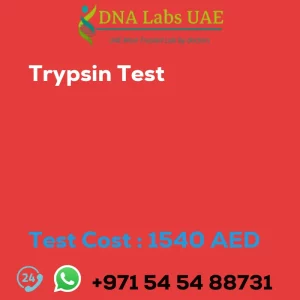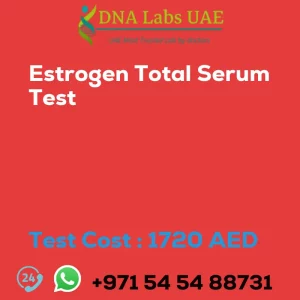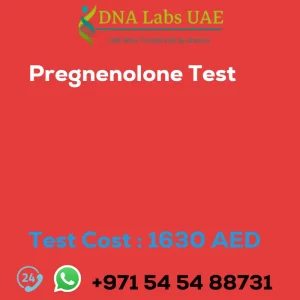STEROID PANEL 21- HYDROXYLASE DEFICIENCY Test
At DNA Labs UAE, we offer the STEROID PANEL 21- HYDROXYLASE DEFICIENCY Test to diagnose and monitor individuals with suspected or known 21-hydroxylase deficiency. This genetic disorder affects the production of hormones in the adrenal glands, leading to various symptoms and health problems.
Test Components
- 17 Hydroxyprogesterone
- Androstenedione
- Cortisol
- 21-deoxycortisol
- 17-Hydroxyprogesterone + 21 deoxycortisol : Cortisol Ratio
Test Cost
AED 590.0
Sample Condition
2 mL (1 mL min.) serum from 1 Red Top (No Additive) tube. Do not use SST gel barrier tubes. Ship refrigerated or frozen. Diurnal variation present; take sample between 8-10 am OR 4-6 pm. Specify time and date on specimen container and test request form.
Report Delivery
Sample Mon / Thu by 9 am; Report Wed / Sat
Method
LC-MS / MS
Test Type
Disorders of Adrenal Gland
Doctor
Endocrinologist
Test Department
GENETIC
Pre Test Information
Diurnal variation present; sample will be taken between 8-10 am OR 4-6 pm.
Test Details
The 21-hydroxylase deficiency test is a part of the steroid panel used to diagnose and monitor individuals with suspected or known 21-hydroxylase deficiency. This condition is a genetic disorder that affects the production of certain hormones in the adrenal glands, leading to a variety of symptoms and health problems.
The 21-hydroxylase enzyme is responsible for converting cholesterol into cortisol, a hormone that helps regulate metabolism, stress response, and immune function. It also plays a role in producing aldosterone, a hormone that helps regulate blood pressure and electrolyte balance.
The test for 21-hydroxylase deficiency typically involves measuring the levels of various hormones in the blood, including cortisol, aldosterone, and certain precursors of these hormones. The most common method used is called the adrenocorticotropic hormone (ACTH) stimulation test.
During this test, a baseline blood sample is taken to measure the levels of cortisol and other hormones. Then, a synthetic form of ACTH, which normally stimulates the adrenal glands to produce cortisol, is injected. After a period of time, usually 30-60 minutes, another blood sample is taken to measure the response of the adrenal glands to the ACTH stimulation.
Individuals with 21-hydroxylase deficiency may have low levels of cortisol and aldosterone and high levels of certain precursors, such as 17-hydroxyprogesterone. The results of the test can help confirm the diagnosis of 21-hydroxylase deficiency and determine the severity of the condition.
In addition to the steroid panel, other tests may be done to further evaluate the adrenal function, such as imaging studies or genetic testing. Treatment for 21-hydroxylase deficiency usually involves hormone replacement therapy to replace the deficient hormones and manage the symptoms and complications associated with the condition.
It is important to note that the 21-hydroxylase deficiency test is typically ordered by a healthcare professional, such as an endocrinologist, and should be interpreted in the context of the individual’s medical history and symptoms.
| Test Name | STEROID PANEL 21- HYDROXYLASE DEFICIENCY Test |
|---|---|
| Components | *17 Hydroxyprogesterone *Androstenedione*Cortisol *21-deoxycortisol *17-Hydroxyprogesterone + 21 deoxycortisol : Cortisol Ratio |
| Price | 590.0 AED |
| Sample Condition | 2 mL (1 mL min.)serum from 1 Red Top (No Additive) tube. Do not use SST gel barrier tubes. Ship refrigerated or frozen. Diurnal variation present; take sample between8-10 am OR 4-6 pm. Specify time and date on specimen container and test request form. |
| Report Delivery | SampleMon / Thu by 9 am; Report Wed / Sat |
| Method | LC-MS / MS |
| Test type | Disorders of Adrenal Gland |
| Doctor | Endocrinologist |
| Test Department: | GENETIC |
| Pre Test Information | Diurnal variation present; sample will be taken between8-10 am OR 4-6 pm. |
| Test Details |
The 21-hydroxylase deficiency test is a part of the steroid panel used to diagnose and monitor individuals with suspected or known 21-hydroxylase deficiency. This condition is a genetic disorder that affects the production of certain hormones in the adrenal glands, leading to a variety of symptoms and health problems. The 21-hydroxylase enzyme is responsible for converting cholesterol into cortisol, a hormone that helps regulate metabolism, stress response, and immune function. It also plays a role in producing aldosterone, a hormone that helps regulate blood pressure and electrolyte balance. The test for 21-hydroxylase deficiency typically involves measuring the levels of various hormones in the blood, including cortisol, aldosterone, and certain precursors of these hormones. The most common method used is called the adrenocorticotropic hormone (ACTH) stimulation test. During this test, a baseline blood sample is taken to measure the levels of cortisol and other hormones. Then, a synthetic form of ACTH, which normally stimulates the adrenal glands to produce cortisol, is injected. After a period of time, usually 30-60 minutes, another blood sample is taken to measure the response of the adrenal glands to the ACTH stimulation. Individuals with 21-hydroxylase deficiency may have low levels of cortisol and aldosterone and high levels of certain precursors, such as 17-hydroxyprogesterone. The results of the test can help confirm the diagnosis of 21-hydroxylase deficiency and determine the severity of the condition. In addition to the steroid panel, other tests may be done to further evaluate the adrenal function, such as imaging studies or genetic testing. Treatment for 21-hydroxylase deficiency usually involves hormone replacement therapy to replace the deficient hormones and manage the symptoms and complications associated with the condition. It is important to note that the 21-hydroxylase deficiency test is typically ordered by a healthcare professional, such as an endocrinologist, and should be interpreted in the context of the individual’s medical history and symptoms. |







